Arts & Entertainment
SPRING ARTS 2018 TV: Small screen delights
‘Rise,’ ‘Roseanne’ reboot, ‘Handmaids’ return pepper TV season
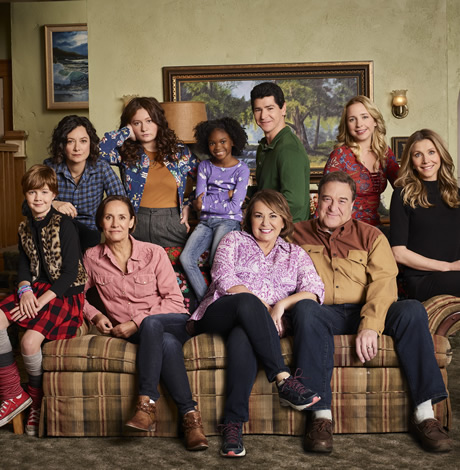
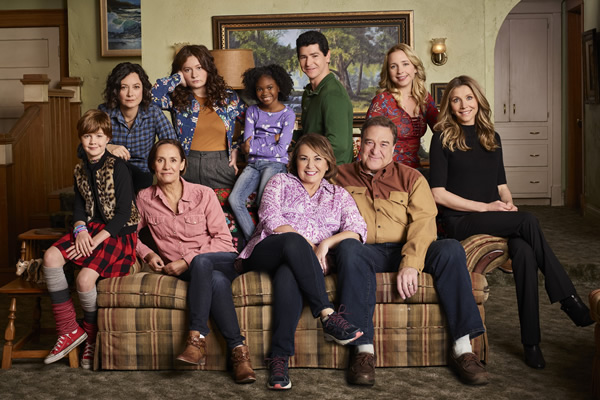
The cast of the ‘Roseanne’ reboot. (Photo courtesy ABC)
The spring 2018 television season may lack some of the sparkle of last year’s schedule, but there are still some new offerings and returning favorites that LGBT TV fans may want to watch.
On March 27, the outspoken Roseanne Barr returns to network television in a continuation (season 10) of the ground-breaking show that bears her name. Most of the original cast will be back. John Goodman returns as Dan Connor (one of the show’s early promos made fun of his return from the dead). Lecy Goranson, Sara Gilbert and Michael Fishman return as the Conner children. In an interesting twist, Sarah Chalke, who briefly replaced Goranson as Becky, will return to the series as a middle-class woman who hires Becky to be her surrogate.
Many of the guest stars will also return, including Roseanne’s lesbian friend Nancy Bartlett (Sandra Bernhard), Roseanne’s African-American neighbors, Natalie West as Crystal and Johnny Galecki as David Healy. The new cast will also be rounded out by several grandchildren. It is not clear if Martin Mull and Fred Willard, whose characters were married on the show, will return.
Early reports from the set say that the series will address the support of both Roseanne Barr and Roseanne Conner for Donald Trump; the death of Becky’s husband Mark Healy — actor Glenn Quinn died in 2002; and that Roseanne’s youngest son Jerry Garcia Conner will not appear because he is “out on a fishing boat.”
“Rise” on NBC has caused controversy even before its premiere on March 13. The series is loosely based on the nonfiction book “Drama High” by Michael Sokolove which tells the true story of high school drama teacher Lou Volpe, who came as gay later in life. Some media outlets have accused producer Jeff Katims with “straight-washing” Sokolove’s book, but the Writers Guild of America has ruled that Katims should be listed as the creator of the television series, instead of saying he “developed” the show from Sokolove’s book.
The show does focus on the drama teacher, played by Jordan Roth, as a straight family man, but Katims adds several LGBT characters, including Michael (played by trans actor Ellie Desautels), a transgender student at the high school; Simon (Ted Sutherland), who is exploring his own sexuality after being cast as a gay character in the school’s production of “Spring Awakening;” and, Volpe’s married lesbian sister-in-law. The cast also includes Rosie Perez as a fellow teacher Volpe and Auli’I Cravalho (the voice of Moana) as a student.
Meanwhile on Paramount, “Heathers” will premiere on March 7. Based on the iconic 1988 movie starring Wynona Ryder, the “pitch-perfect black comedy anthology series” is set in the present day. The story still focuses on “good girl” Veronica Sawyer, along with her boyfriend JD and “the Heathers,” a vicious clique who ruthlessly control life at Westerburg High. This time, however, one of the Heathers is played by a man. Shannon Doherty, one of the cinematic Heathers, will make a guest appearance.
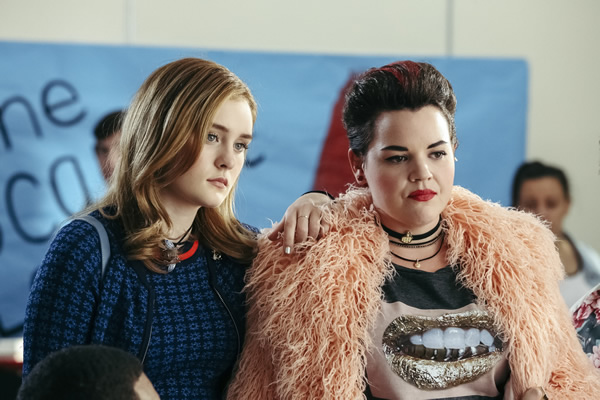
Veronica Sawyer (Grace Victoria Cox) and Heather Chandler (Melanie Field) in the small-screen version of ‘Heathers.’ (Photo courtesy Paramount)
On April 25, a year after the first episode of season one aired, season two of “The Handmaid’s Tale” will premiere on Hulu. The entire main cast will return, including Elisabeth Moss as June/Offred, Ann Dowd as the terrifying Aunt Lydia, openly lesbian actress Samira Wiley as June’s best friend Moira and Alexis Bledsel as the lesbian Handmaid Ofglen, who was formerly known as Emily. New cast members include Clea DuVall as Emily’s wife, openly lesbian actress Cherry Jones as June’s mother, Bradley Whitford as Commander Joseph Lawrence and Marisa Tomei.
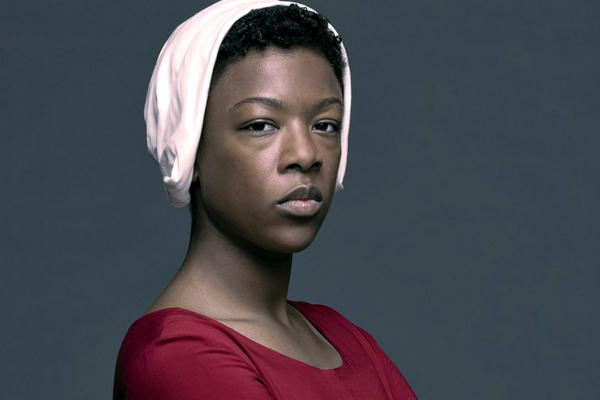
Samira Wiley returns as Moira in season two of ‘The Handmaids Tale.’ (Photo courtesy Hulu)
Working closely with novelist Margaret Atwood, writer Bruce Miller has continued to expand the world of Gilead, a dystopian vision of the United States after a theocratic regime has taken power. Fertile women, known as Handmaidens, are forced to be surrogates for the Commanders and their infertile wives; women who resist are forced to clean up toxic waste dumps known as “the Colonies.” Details about season two are sparse, but it is known that there is a large state funeral and that some scenes are set in the horrific Colonies.
And, on April 13, Netflix will reboot a classic sci-fi series, but without an iconic character generally assumed to be gay. In the original “Lost In Space,” Dr. Zachary Smith was played by Jonathan Harris with a delicious campy flair. In a fascinating gender swap, Parker Posey take over the role of the nefarious stowaway. In another interesting casting move, Ignacio Serricchio will claim the role of Major Don West created by Mark Goddard.
In addition, several returning or continuing shows continue to include LGBT characters, although generally in supporting roles.
Season two of “Jessica Jones” returns to Netflix on March 8 (International Women’s Day). Part of the Marvel Comic Universe, the series is grounded in a feminist sensibility with strong women on both sides of the camera. The series stars Krysten Ritter, who was nominated for a Dorian Award from the LGBT critic’s group GALECA, and Carrie Anne Moss as Jones’ lesbian boss Jeri Hogarth.
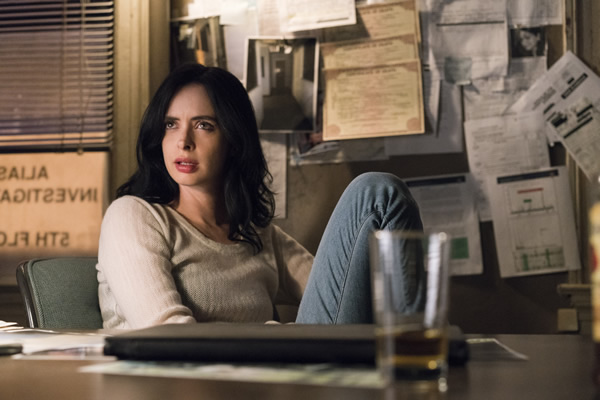
‘Jessica Jones’ returns to Netflix. (Photo courtesy Netflix)
“Black Lightning,” which premiered on the CW in January, is based on the DC comic about a family of African-American superheroes. Cress Williams plays the title character and Nafessa Williams plays his daughter Anissa Pierce, a crime-fighter who is developing her superpowers under the name of Thunder.
Fox’s airline comedy “LA to Vegas” debuted in January to weak reviews and strong ratings, but it has made a star of Nathan Lee Graham who plays gay flight attendant Bernard. The openly gay actor played Miss Understanding in the original Broadway cast of “Priscilla, Queen of the Desert” and was recently presented with the Jose Esteban Munoz Award from CLAGS: the Center for LGBTQ Studies at the Graduate Center, CUNY. The award is given to an LGBT activist who promotes queer studies outside of academia.
Some of the other shows that continue to feature members of the LGBT community include “Dynasty” with Nicollette Sheridan joining the cast as Alexis; Tig Nataro on Amazon’s “One Mississippi”; the rebooted “Queer Eye for the Straight Guy”; “The Bold and The Beautiful” where Kayla Mosley heats up the set as transgender woman Maya Avant; “Supergirl”; Lena Waithe’s “Chi”; the popular ABC comedy “Modern Family” which was recently renewed for a 10th and final season (although there are talks of a spinoff); and “Grown-ish,” a spin-off of ABC’s “Black-ish.”
There’s also “Call the Midwife” (PBS), “Valor” (the CW), “Madam Secretary” (CBS), “The Fosters” (Freeform), “Riverdale” (the CW), “Portlandia” (IFC), “Grey’s Anatomy” (ABC), “How To Get Away With Murder” (ABC), “Arrow” (the CW) “One Day At A Time” (Netflix) and “Jane the Virgin” (the CW).
Books
‘Pronoun Trouble’ reminds us that punctuation matters
‘They’ has been a shape-shifter for more than 700 years

‘Pronoun Trouble’
By John McWhorter
c.2025, Avery
$28/240 pages
Punctuation matters.
It’s tempting to skip a period at the end of a sentence Tempting to overuse exclamation points!!! very tempting to MeSs with capital letters. Dont use apostrophes. Ask a question and ignore the proper punctuation commas or question marks because seriously who cares. So guess what? Someone does, punctuation really matters, and as you’ll see in “Pronoun Trouble” by John McWhorter, so do other parts of our language.

Conversation is an odd thing. It’s spontaneous, it ebbs and flows, and it’s often inferred. Take, for instance, if you talk about him. Chances are, everyone in the conversation knows who him is. Or he. That guy there.
That’s the handy part about pronouns. Says McWhorter, pronouns “function as shorthand” for whomever we’re discussing or referring to. They’re “part of our hardwiring,” they’re found in all languages, and they’ve been around for centuries.
And, yes, pronouns are fluid.
For example, there’s the first-person pronoun, I as in me and there we go again. The singular I solely affects what comes afterward. You say “he-she IS,” and “they-you ARE” but I am. From “Black English,” I has also morphed into the perfectly acceptable Ima, shorthand for “I am going to.” Mind blown.
If you love Shakespeare, you may’ve noticed that he uses both thou and you in his plays. The former was once left to commoners and lower classes, while the latter was for people of high status or less formal situations. From you, we get y’all, yeet, ya, you-uns, and yinz. We also get “you guys,” which may have nothing to do with guys.
We and us are warmer in tone because of the inclusion implied. She is often casually used to imply cars, boats, and – warmly or not – gay men, in certain settings. It “lacks personhood,” and to use it in reference to a human is “barbarity.”
And yes, though it can sometimes be confusing to modern speakers, the singular word “they” has been a “shape-shifter” for more than 700 years.
Your high school English teacher would be proud of you, if you pick up “Pronoun Trouble.” Sadly, though, you might need her again to make sense of big parts of this book: What you’ll find here is a delightful romp through language, but it’s also very erudite.
Author John McWhorter invites readers along to conjugate verbs, and doing so will take you back to ancient literature, on a fascinating journey that’s perfect for word nerds and anyone who loves language. You’ll likely find a bit of controversy here or there on various entries, but you’ll also find humor and pop culture, an explanation for why zie never took off, and assurance that the whole flap over strictly-gendered pronouns is nothing but overblown protestation. Readers who have opinions will like that.
Still, if you just want the pronoun you want, a little between-the-lines looking is necessary here, so beware. “Pronoun Trouble” is perfect for linguists, writers, and those who love to play with words but for most readers, it’s a different kind of book, period.
The Blade may receive commissions from qualifying purchases made via this post.

Friday, April 18
“Center Aging Friday Tea Time” will be at 2 p.m. on Zoom. This is a social hour for older LGBTQ+ adults. Guests are encouraged to bring a beverage of choice. For more details, email [email protected].
Go Gay DC will host “LGBTQ+ Community Social in the City” at 7 p.m. at Hotel Zena. This event is ideal for making new friends, professional networking, idea-sharing, and community building. This event is free and more details are available on Eventbrite.
Trans and Genderqueer Game Night will be at 6 p.m. at the DC Center for the LGBT Community. This will be a relaxing, laid-back evening of games and fun. All are welcome and there’ll be card and board games on hand. Feel free to bring your own games to share. For more details, visit the DC Center’s website.
Saturday, April 19
Go Gay DC will host “LGBTQ+ Community Brunch” at 11 a.m. at Freddie’s Beach Bar & Restaurant. This fun weekly event brings the DMV area LGBTQ+ community, including Allies, together for delicious food and conversation. Attendance is free and more details are available on Eventbrite.
LGBTQ People of Color Support Group will be at 7 p.m. on Zoom. This peer support group is an outlet for LGBTQ People of Color to come together and talk about anything affecting them in a space that strives to be safe and judgement free. There are all sorts of activities like watching movies, poetry events, storytelling, and just hanging out with others. For more information and events for LGBTQ People of Color, visit thedccenter.org/poc or facebook.com/centerpoc.
“Spark Sapphic Social” will be at 8 p.m. at Spark Social House. This weekly sapphic social is an opportunity to mix and mingle with other sapphics in D.C.’s newest LGBTQ bar. This event is free and more details are available on Eventbrite.
“DC Drag Brunch on Rooftop – Penthouse (Formerly at Lima Twist)” will be at 12 p.m. at Baby Shank Rooftop. Hosted by Miss Capital Pride, this is the ultimate drag brunch experience in Washington, D.C., featuring the fiercest queens around. Prepare to be entertained by glamorous drag queens and celebrated celebrity impersonators, including Taylor Swift, Lady Gaga, Beyoncé, Britney Spears, Nicki Minaj, Ariana Grande, Whitney Houston, Cher and many more. Tickets cost $27 and are available on Eventbrite.
Sunday, April 20
Queer Crayon Club will host “Queer Sketch Social” at 3 p.m. at Sinners and Saints. This is a fun event for LGBTQ+ adults to come together and color. Attendance is free and more details are available on Eventbrite.
Monday, April 21
“Center Aging Monday Coffee & Conversation” will be at 10 a.m. on Zoom. This is a social hour for older LGBTQ+ adults. Guests are encouraged to bring a beverage of choice. For more details, email [email protected].
Tuesday, April 22
Genderqueer DC will be at 7 p.m. on Zoom. This support group is for people who identify outside of the gender binary. Whether you’re bigender, agender, genderfluid, or just know that you’re not 100% cis – this is your group. For more details, visit www.genderqueerdc.org or Facebook.
Coming Out Discussion Group will be at 7 p.m. on Zoom. This is a peer-facilitated discussion group and a safe space to share experiences about coming out and discuss topics as it relates to doing so. For more details, visit the group’s Facebook.
Wednesday, April 23
Job Club will be at 6 p.m. on Zoom. This is a weekly job support program to help job entrants and seekers, including the long-term unemployed, improve self-confidence, motivation, resilience and productivity for effective job searches and networking — allowing participants to move away from being merely “applicants” toward being “candidates.” For more information, email [email protected] or visit thedccenter.org/careers.
Asexual and Aromantic Discussion Group will be at 7 p.m. on Zoom. This is a space where people who are questioning this aspect of their identity or those who identify as asexual and/or aromantic can come together, share stories and experiences, and discuss various topics. For more details, email [email protected].
Thursday, April 24
Virtual Yoga with Sarah M. will be at 7 p.m. on Zoom. This is a free weekly class focusing on yoga, breath work, and meditation. For more details, visit the DC Center for the LGBT Community’s website.
DC Anti-Violence Project Open Meeting will be at 7 p.m. on Zoom. This meeting is open to anyone interested in learning more and getting involved in lessening violence both within and directed towards the LGBT communities. For more information, visit Facebook or Twitter.
Movies
Heartfelt ‘Wedding Banquet’ remake a romcom worth seeing
Mishaps, crossed wires, conflicts are all part of the fun
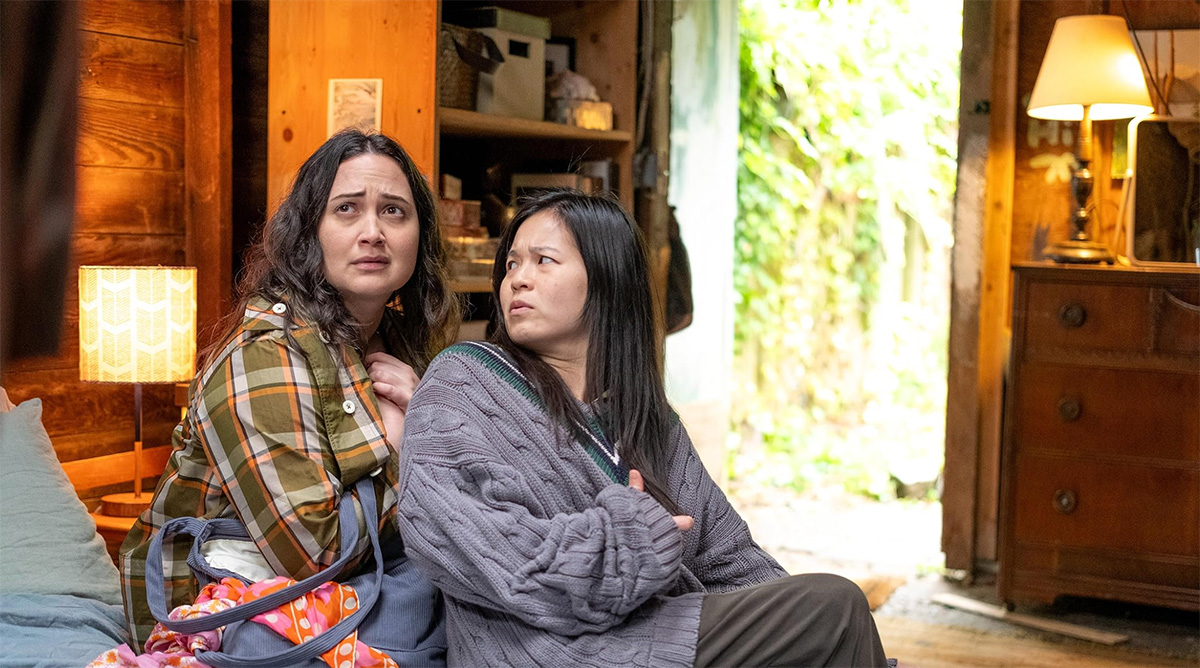
Creating a worthy remake can be a tricky proposition, especially when the movie being remade is a beloved classic – but that doesn’t mean it’s an impossible one.
Consider Andrew Ahn’s new version of 1993’s “The Wedding Banquet,” a film that put future “Brokeback Mountain” director Ang Lee on the proverbial map in America, which opens in theaters this weekend after a debut at Sundance earlier this year. The original, an American/Taiwanese production which became a surprise hit in the U.S., broke ground with its story — a culture-clash comedy of manners about a queer romantic triangle attempting to stage a sham wedding, it was quickly embraced by LGBTQ audiences thrilled to see representation on the big screen and positive representation, at that, in an era when it was even scarcer than it is today. To undertake a remake of such a film is a bold move, to say the least.
Yet gay Korean American writer/director Ahn (“Spa Night,” “Fire Island”) – has built his blossoming career on films about queer relationships among Asian American characters, with as much (or more) emphasis on family, both biological and chosen, as on romantic partnership; It seems natural, perhaps, for him to reinterpret this influential classic through his own lens, and he’s already proven himself as a filmmaker whose strengths line up perfectly with the material.
Even so, Ahn hedges his bets, perhaps, by collaborating on the new screenplay with James Schamus, who also co-wrote the original (along with Lee and Neil Peng), and the result is a movie that – although it recrafts the original romcom for a newer age and reconfigures its central relationships a bit to “up the ante” on its complications – stays relatively faithful to the broad strokes of its plot.
In this iteration, the New York setting is transposed to Seattle, and the plot revolves around not just one queer romance, but two: Chris and Min (Bowen Yang and Han Gi-Chan), a stalled grad student and his South Korean boyfriend, and their lesbian friends-and-landladies Lee and Angela (Lily Gladstone and Kelly Marie Tran), who are struggling to become parents through expensive IVF treatments. Min, an artist whose temporary visa is about to expire, wants to stay with Chris and build a life in America, but his grandmother (Youn Yuh-jung) – currently running the vast family business empire to which he is heir – wants him to come home and claim his place in the organization. A wedding to Chris would secure him the green card he needs to defy his grandmother’s demands, but it would also mean outing himself as gay and potentially being cut off from his inheritance. As a solution, he offers to pay for Lee and Angela’s fertilization procedure in exchange for a “green card wedding” with the latter, ensuring that he can remain in the U.S. while also remaining in the closet to his family.
Of course it’s an idea as bad as it sounds, but despite some reticence, the couples agree to the plan; but when grandmother decides to come to America and meet the bride in person, the four of them must attempt to pull off a masquerade that escalates far beyond their expectations after she insists on putting on a traditional – and elaborate – Korean wedding worthy of her grandson’s exalted status, all while wrestling with the ambivalence and doubts that begin to encroach on their relationships as the scheme begins to fray at the edges.
Those who’ve seen the original already know that things don’t play out exactly as planned – and anyone who hasn’t won’t be surprised when it doesn’t, anyway. We already told you it was a bad idea.
That, of course, is the charm of the romcom, a genre in which mishaps, crossed wires and conflicts are all part of the fun, and in any case it gives Ahn’s film the opportunity to explore – as Lee did with the original – the more serious and relatable challenges of reconciling our queerness with the deeply ingrained traditions of our cultural background; he does so with gentle wit and an equal measure of respect, but he’s not above getting laughs by pointing up the sheer absurdity that sometimes goes along with the process. Neither does he hesitate to delve into the messiness of queer relationships, even (and perhaps especially) with lifelong friends, or the deep insecurities and self-criticisms which get in the way of sorting them out.
To these ends, “Wedding Banquet” relies heavily on its cast, who embrace and clearly relish the chance to flesh out these characters. Yang brings his inevitable “SNL” star power to the table but downplays the wackiness in favor of a more nuanced tone, and Gi-Chan shines as his pragmatically idealistic partner; Gladstone’s intelligence and authenticity is a grounding force, while Tran counterpoints her with an eminently likable turn as her spunky-but-anxious misfit of a girlfriend – and the resonance they each bring to the prospect of motherhood highlights the longing for family and legacy that so many queer couples carry as they build their lives together.
It’s not all about the couples, though. Veteran Chinese American actress Joan Chen (“Tai Pan,” “Twin Peaks”) is a scene stealer as Angela’s hyper-supportive mom, whose participation in her daughter’s “lavender wedding” requires her to go against her deepest instincts as a proud ally, and Bobo Le provides a further connection to the theme of family with a charming performance as Yang’s tomboy-ish little sister. The anchoring performance, however, comes from acclaimed Korean star Yuh-jong, whose shrewd, savvy, and staunch portrayal of Gi-Chan’s power player grandma adds a much-needed dose of level-headed wisdom into the midst of the whirlwind.
In the end, Ahn’s update of Lee’s classic comedy scores big points for honoring the original’s message of acceptance and embracing the notion of reimagining our ideas of traditional family structures to meet the needs of an ever-changing world; it also succeeds in maintaining a heartfelt sense of empathy for each of its characters, all of whom appeal to us precisely because of their imperfections and their hangups. None of them are perfect, but all of them are perfectly human, which goes a long way toward making Ahn’s remake feel like more than just the slickly-made feel-good romcom it resembles.
And yet, given the screwball potential and the endless possibilities for farcical developments in the convoluted deception attempted by its sets of lovers, Ahn’s “Wedding Banquet” could have been funnier. Leaning into an idealized and sentimental perspective as it gracefully brings its characters’ lives into place, it occasionally feels a bit “precious,” too “Hollywood” to be believed.
Again, however, this is part of the charm of the romcom: if generations of straight audiences have gotten the chance to buy into idealized big screen fantasies about life and love, then why shouldn’t we enjoy the same privilege?
With that in mind, “The Wedding Banquet” makes for a perfect opportunity to entertain and validate ourselves – and even if it doesn’t tickle your funny bone, it’s a generous enough feast for your queer soul that it deserves you to see it.
Just make sure you bring somebody special to share your popcorn with.
-

 El Salvador3 days ago
El Salvador3 days agoGay Venezuelan makeup artist remains in El Salvador mega prison
-

 District of Columbia5 days ago
District of Columbia5 days agoReenactment of 1965 gay rights protest at White House set for April 17
-

 State Department2 days ago
State Department2 days agoHIV/AIDS activists protest at State Department, demand full PEPFAR funding restoration
-

 Opinions4 days ago
Opinions4 days agoScience must not be a weapon against trans people








